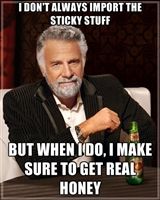The problem of honey laundering has been an ongoing issue and garnered a lot of media attention in the last several years. Many circulating reports speculate that much of the honey purchased in the United States contains artificial and even dangerous ingredients such as antibiotics, lead and other heavy metals.
Business Insider reports that two companies were recently exposed and will pay millions of dollars in fines for knowingly selling mislabeled honey containing the toxin chloramphenicol. By searching the names of both companies Honey Holding and Groeb Farms in the ImportGenius.com database, the shipping records show that both companies’ imports have been affected by the scandal. Neither company has imports on record for this year, or since the end of December 2012. This is far different from the import activity of 2012, in which Groeb Farms imported 2.1 billion pounds of honey just last year. With the same token, Honey Holdings’s imports exceeded 1.6 million pounds in 2012. The Strategic Sourcerer reports that investigations by the U.S. Immigrations and Customs Enforcement and the Department of HomelandSecurity found that Chinese suppliers labeled their freight with a different country of origin prior to shipping.

This makes it difficult to pinpoint exactly which supplier is responsible for the illegitimate honey. However, we’re able to see from the Import Genius visual mapping tool that ‘Kashmir Apiaries Exports’’ ships to Groeb Farms and also manufactures to ‘Sioux Honey Association’ in Iowa. One particular supplier Y.D. Foods Co. Ltd out of Vietnam supplying to ‘Mel-O Honey Inc.’ in Minnesota, also works with both Honey Holding and Groeb Farms. Tapping into Honey Holding’s records, it looks like they use the same supplier that also ships to ‘Silverbrow Honey Company, Inc.’ in Washington. Seeing the supply chain poses the question of whether or not even more U.S. domestic honey suppliers are receiving tainted products from overseas for distribution. The important question honey companies across the U.S. must address is whether they’re taking the proper precautions to ensure their imports are real honey. For importers just starting to order honey, they should visit their supplier to see where the honey is actually coming from. There are measures already in place to verify the authenticity and quality of imported honey. “According to Fox News, legitimate producers and importers have the ability to source their honey and keep a trail of where it originates from, which ensures they are in compliance with any procurement requirements, pay necessary duties and aren't selling consumers a product that could be laced with unapproved drugs.” More information from the Strategic Sourcerer also points to the process ahead for Groeb Farms and Honey Holdings. The negative attention and charges mean that both companies must make changes to their suppliers to ensure they’re meeting industry standards.
